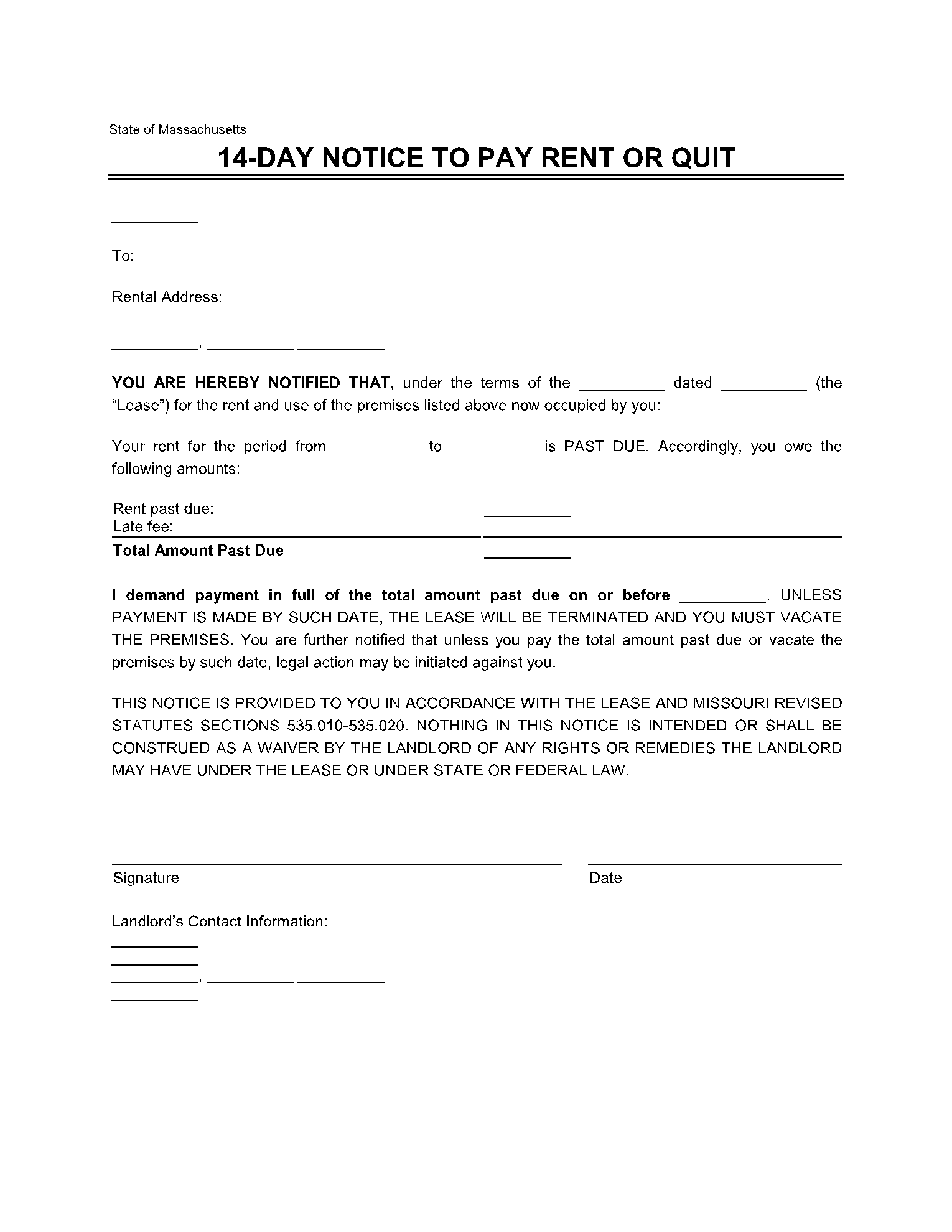If you're a landlord looking to evict a resident, start with a Massachusetts notice to Quit. Your eviction notice must follow Massachusetts state law and give your tenant the legal period of time to answer or vacate the premises.
If the tenant ignores the eviction notice, the landlord can file an eviction case, also known as a Summons and Complaint, in the Local Housing Court, Boston Municipal Court, or the District Court that covers the property's area.
What Does A 14-day Notice Mean?
Tenants who fail to pay rent by the due date stated in their contract are presented with a Massachusetts 14 day notice to quit or pay. According to the notice, the tenant has 14 days to pay the total amount of rent due or vacate the rental unit.
The landlord will begin the notice to quit the MA process by buying a Summons and Complaint from the clerk's office and serving the tenant's document if the tenant does not pay rent or move out by the end of the 14th day.
What is the Eviction Process in Massachusetts?
To begin the 14-day notice to quit MA, follow these steps.
Step 1: Submit the eviction notice.
To begin the notice to quit the MA process, the landlord must first give the tenant the proper 14-day notice to quit Massachusetts.
Step 2: Wait for the tenant to respond.
If the tenant fixes the issue or vacates the premises within the specified timeframe, no further action is taken.
Step 3: Go to the court and file a summons and complaint.
If the tenant refuses to respond to the Massachusetts notice to quit, fails to respond, or fails to cure the breach(es), the landlord can file a Summons and Complaint with the court. The landlord must file an action against the tenant using the court's form and pay a filing fee when presenting the Summons and Complaint.
Step 4: Submit forms before the hearing.
It requires the landlord to fill out the notice to quit MA forms and serve them to the tenant. After that, the landlord must make a copy of the service and submit it to the court.
Step 5: The tenant responds to the complaint.
By the first Monday before the scheduled trial date, the tenant has the right to appeal and counter the arguments brought against them using the Summary Process Response Form.
Both the landlord and the tenant could file a Discovery request before the hearing date to see the records used against them in court. The first Monday following the entry day is the deadline for filing a discovery.
Step 6: Evict the occupant.
If the tenant fails to respond or the landlord wins the case, the landlord will seek an execution eleven days after the judgment is made.
The sheriff will serve the tenant's execution and give them 48 hours to vacate the premises until accepted. If the occupant may not vacate the property within 48 hours, the sheriff has the power to evict them physically.
How to Respond to Massachusetts 14 day Eviction Notice Forms?
You have the right to respond to your landlord's Notice to quit MA. You may want to file the following documents as part of your response:
- Pay any previous rent to the landlord within the time frame specified in the notice to quit Massachusetts.
- Leave the premises within the time frame specified in the notice to quit Massachusetts.
- Your response and defenses to the allegations made by your landlord in the complaint.
- Claims you bring against your landlord are known as counterclaims. If successful, counterclaims minimize the sum you owe or compel your landlord to pay you money. You can't file counterclaims if you're being evicted for a lease breach.
- You may ask the court to dismiss the landlord's lawsuit. If it is satisfactory, the landlord's case against you may be rejected, or they will have to begin the process all over again.
- Discovery is a request from your landlord for more details. The trial date is delayed two weeks due to the timely filing of discovery. However, this seldom prevents eviction.
Conclusion
Before any legal eviction may occur in Massachusetts, landlords are expected to serve a notice to quit MA to their tenants. When a resident is 14 days past due on any rent, the 14-day notice to quit MA for Nonpayment Of Rent is used.
A Massachusetts landlord can only evict a tenant if the lease period has expired, if the tenant has broken a particular clause of the rental agreement, or if the rent has not been paid. To evict a tenant, all landlords must obey the Massachusetts eviction process.
